- Home
- Jack London
The Turtles of Tasman Page 11
The Turtles of Tasman Read online
Page 11
When he had finished he selected a piece of meat weighing a hundred pounds, and started to drag it down to the tent. But the snow was soft, and it was too much for him. He exchanged it for a twenty-pound piece, and, with many pauses to rest, succeeded in getting it to the tent. He fried some of the meat, but ate sparingly. Then, and automatically, he went out to his crouching place on the bank. There were sled-tracks in the fresh snow on the trail. The sled-load of life had passed by while he had been cutting up the moose.
But he did not mind. He was glad that the sled had not passed before the coming of the moose. The moose had changed his plans. Its meat was worth fifty cents a pound, and he was but little more than three miles from Minto. He need no longer wait for the sled-load of life. The moose was the sled-load of life. He would sell it. He would buy a couple of dogs at Minto, some food and some tobacco, and the dogs would haul him south along the trail to the sea, the sun, and civilisation.
He felt hungry. The dull, monotonous ache of hunger had now become a sharp and insistent pang. He hobbled back to the tent and fried a slice of meat. After that he smoked two whole pipefuls of dried tea leaves. Then he fried another slice of moose. He was aware of an unwonted glow of strength, and went out and chopped some firewood. He followed that up with a slice of meat. Teased on by the food, his hunger grew into an inflammation. It became imperative every little while to fry a slice of meat. He tried smaller slices and found himself frying oftener.
In the middle of the day he thought of the wild animals that might eat his meat, and he climbed the hill, carrying along his axe, the haul rope, and a sled lashing. In his weak state the making of the cache and storing of the meat was an all-afternoon task. He cut young saplings, trimmed them, and tied them together into a tall scaffold. It was not so strong a cache as he would have desired to make, but he had done his best. To hoist the meat to the top was heart-breaking. The larger pieces defied him until he passed the rope over a limb above, and, with one end fast to a piece of meat, put all his weight on the other end.
Once in the tent, he proceeded to indulge in a prolonged and solitary orgy. He did not need friends. His stomach and he were company. Slice after slice and many slices of meat he fried and ate. He ate pounds of the meat. He brewed real tea, and brewed it strong. He brewed the last he had. It did not matter. On the morrow he would be buying tea in Minto. When it seemed he could eat no more, he smoked. He smoked all his stock of dried tea leaves. What of it? On the morrow he would be smoking tobacco. He knocked out his pipe, fried a final slice, and went to bed. He had eaten so much he seemed bursting, yet he got out of his blankets and had just one more mouthful of meat.
In the morning he awoke as from the sleep of death. In his ears were strange sounds. He did not know where he was, and looked about him stupidly until he caught sight of the frying-pan with the last piece of meat in it, partly eaten. Then he remembered all, and with a quick start turned his attention to the strange sounds. He sprang from the blankets with an oath. His scurvy-ravaged legs gave under him and he winced with the pain. He proceeded more slowly to put on his moccasins and leave the tent.
From the cache up the hillside arose a confused noise of snapping and snarling, punctuated by occasional short, sharp yelps. He increased his speed at much expense of pain, and cried loudly and threateningly. He saw the wolves hurrying away through the snow and underbrush, many of them, and he saw the scaffold down on the ground. The animals were heavy with the meat they had eaten, and they were content to slink away and leave the wreckage.
The way of the disaster was clear to him. The wolves had scented his cache. One of them had leapt from the trunk of the fallen tree to the top of the cache. He could see marks of the brute's paws in the snow that covered the trunk. He had not dreamt a wolf could leap so far. A second had followed the first, and a third and fourth, until the flimsy scaffold had gone down under their weight and movement.
His eyes were hard and savage for a moment as he contemplated the extent of the calamity; then the old look of patience returned into them, and he began to gather together the bones well picked and gnawed. There was marrow in them, he knew; and also, here and there, as he sifted the snow, he found scraps of meat that had escaped the maws of the brutes made careless by plenty.
He spent the rest of the morning dragging the wreckage of the moose down the hillside. In addition, he had at least ten pounds left of the chunk of meat he had dragged down the previous day.
"I'm good for weeks yet," was his comment as he surveyed the heap.
He had learnt how to starve and live. He cleaned his rifle and counted the cartridges that remained to him. There were seven. He loaded the weapon and hobbled out to his crouching-place on the bank. All day he watched the dead trail. He watched all the week, but no life passed over it.
Thanks to the meat he felt stronger, though his scurvy was worse and more painful. He now lived upon soup, drinking endless gallons of the thin product of the boiling of the moose bones. The soup grew thinner and thinner as he cracked the bones and boiled them over and over; but the hot water with the essence of the meat in it was good for him, and he was more vigorous than he had been previous to the shooting of the moose.
It was in the next week that a new factor entered into Morganson's life. He wanted to know the date. It became an obsession. He pondered and calculated, but his conclusions were rarely twice the same. The first thing in the morning and the last thing at night, and all day as well, watching by the trail, he worried about it. He awoke at night and lay awake for hours over the problem. To have known the date would have been of no value to him; but his curiosity grew until it equalled his hunger and his desire to live. Finally it mastered him, and he resolved to go to Minto and find out.
It was dark when he arrived at Minto, but this served him. No one saw him arrive. Besides, he knew he would have moonlight by which to return. He climbed the bank and pushed open the saloon door. The light dazzled him. The source of it was several candles, but he had been living for long in an unlighted tent. As his eyes adjusted themselves, he saw three men sitting around the stove. They were trail-travellers-he knew it at once; and since they had not passed in, they were evidently bound out. They would go by his tent next morning.
The barkeeper emitted a long and marvelling whistle.
"I thought you was dead," he said.
"Why?" Morganson asked in a faltering voice.
He had become unused to talking, and he was not acquainted with the sound of his own voice. It seemed hoarse and strange.
"You've been dead for more'n two months, now," the barkeeper explained. "You left here going south, and you never arrived at Selkirk. Where have you been?"
"Chopping wood for the steamboat company," Morganson lied unsteadily.
He was still trying to become acquainted with his own voice. He hobbled across the floor and leant against the bar. He knew he must lie consistently; and while he maintained an appearance of careless indifference, his heart was beating and pounding furiously and irregularly, and he could not help looking hungrily at the three men by the stove. They were the possessors of life-his life.
"But where in hell you been keeping yourself all this time?" the barkeeper demanded.
"I located across the river," he answered. "I've got a mighty big stack of wood chopped."
The barkeeper nodded. His face beamed with understanding.
"I heard sounds of chopping several times," he said. "So that was you, eh? Have a drink?"
Morganson clutched the bar tightly. A drink! He could have thrown his arms around the man's legs and kissed his feet. He tried vainly to utter his acceptance; but the barkeeper had not waited and was already passing out the bottle.
"But what did you do for grub?" the latter asked. "You don't look as if you could chop wood to keep yourself warm. You look terribly bad, friend."
Morganson yearned towards the delayed bottle and gulped dryly.
"I did the chopping before the scurvy got bad," he said. "Then I got a moose right at the sta
rt. I've been living high all right. It's the scurvy that's run me down."
He filled the glass, and added, "But the spruce tea's knocking it, I think."
"Have another," the barkeeper said.
The action of the two glasses of whisky on Morganson's empty stomach and weak condition was rapid. The next he knew he was sitting by the stove on a box, and it seemed as though ages had passed. A tall, broad-shouldered, black-whiskered man was paying for drinks. Morganson's swimming eyes saw him drawing a greenback from a fat roll, and Morganson's swimming eyes cleared on the instant. They were hundred-dollar bills. It was life! His life! He felt an almost irresistible impulse to snatch the money and dash madly out into the night.
The black-whiskered man and one of his companions arose.
"Come on, Oleson," the former said to the third one of the party, a fair-haired, ruddy-faced giant.
Oleson came to his feet, yawning and stretching.
"What are you going to bed so soon for?" the barkeeper asked plaintively. "It's early yet."
"Got to make Selkirk to-morrow," said he of the black whiskers.
"On Christmas Day!" the barkeeper cried.
"The better the day the better the deed," the other laughed.
As the three men passed out of the door it came dimly to Morganson that it was Christmas Eve. That was the date. That was what he had come to Minto for. But it was overshadowed now by the three men themselves, and the fat roll of hundred-dollar bills.
The door slammed.
"That's Jack Thompson," the barkeeper said. "Made two millions on Bonanza and Sulphur, and got more coming. I'm going to bed. Have another drink first."
Morganson hesitated.
"A Christmas drink," the other urged. "It's all right. I'll get it back when you sell your wood."
Morganson mastered his drunkenness long enough to swallow the whisky, say good night, and get out on the trail. It was moonlight, and he hobbled along through the bright, silvery quiet, with a vision of life before him that took the form of a roll of hundred-dollar bills.
He awoke. It was dark, and he was in his blankets. He had gone to bed in his moccasins and mittens, with the flaps of his cap pulled down over his ears. He got up as quickly as his crippled condition would permit, and built the fire and boiled some water. As he put the spruce-twigs into the teapot he noted the first glimmer of the pale morning light. He caught up his rifle and hobbled in a panic out to the bank. As he crouched and waited, it came to him that he had forgotten to drink his spruce tea. The only other thought in his mind was the possibility of John Thompson changing his mind and not travelling Christmas Day.
Dawn broke and merged into day. It was cold and clear. Sixty below zero was Morganson's estimate of the frost. Not a breath stirred the chill Arctic quiet. He sat up suddenly, his muscular tensity increasing the hurt of the scurvy. He had heard the far sound of a man's voice and the faint whining of dogs. He began beating his hands back and forth against his sides. It was a serious matter to bare the trigger hand to sixty degrees below zero, and against that time he needed to develop all the warmth of which his flesh was capable.
They came into view around the outjutting clump of trees. To the fore was the third man whose name he had not learnt. Then came eight dogs drawing the sled. At the front of the sled, guiding it by the gee-pole, walked John Thompson. The rear was brought up by Oleson, the Swede. He was certainly a fine man, Morganson thought, as he looked at the bulk of him in his squirrel-skin parka. The men and dogs were silhouetted sharply against the white of the landscape. They had the seeming of two dimension, cardboard figures that worked mechanically.
Morganson rested his cocked rifle in the notch in the tree. He became abruptly aware that his fingers were cold, and discovered that his right hand was bare. He did not know that he had taken off the mitten. He slipped it on again hastily. The men and dogs drew closer, and he could see their breaths spouting into visibility in the cold air. When the first man was fifty yards away, Morganson slipped the mitten from his right hand. He placed the first finger on the trigger and aimed low. When he fired the first man whirled half around and went down on the trail.
In the instant of surprise, Morganson pulled the trigger on John Thompson-too low, for the latter staggered and sat down suddenly on the sled. Morganson raised his aim and fired again. John Thompson sank down backward along the top of the loaded sled.
Morganson turned his attention to Oleson. At the same time that he noted the latter running away towards Minto he noted that the dogs, coming to where the first man's body blocked the trail, had halted. Morganson fired at the fleeing man and missed, and Oleson swerved. He continued to swerve back and forth, while Morganson fired twice in rapid succession and missed both shots. Morganson stopped himself just as he was pulling the trigger again. He had fired six shots. Only one more cartridge remained, and it was in the chamber. It was imperative that he should not miss his last shot.
He held his fire and desperately studied Oleson's flight. The giant was grotesquely curving and twisting and running at top speed along the trail, the tail of his parka flapping smartly behind. Morganson trained his rifle on the man and with a swaying action followed his erratic flight. Morganson's finger was getting numb. He could scarcely feel the trigger. "God help me," he breathed a prayer aloud, and pulled the trigger. The running man pitched forward on his face, rebounded from the hard trail, and slid along, rolling over and over. He threshed for a moment with his arms and then lay quiet.
Morganson dropped his rifle (worthless now that the last cartridge was gone) and slid down the bank through the soft snow. Now that he had sprung the trap, concealment of his lurking-place was no longer necessary. He hobbled along the trail to the sled, his fingers making involuntary gripping and clutching movements inside the mittens.
The snarling of the dogs halted him. The leader, a heavy dog, half Newfoundland and half Hudson Bay, stood over the body of the man that lay on the trail, and menaced Morganson with bristling hair and bared fangs. The other seven dogs of the team were likewise bristling and snarling. Morganson approached tentatively, and the team surged towards him. He stopped again and talked to the animals, threatening and cajoling by turns. He noticed the face of the man under the leader's feet, and was surprised at how quickly it had turned white with the ebb of life and the entrance of the frost. John Thompson lay back along the top of the loaded sled, his head sunk in a space between two sacks and his chin tilted upwards, so that all Morganson could see was the black beard pointing skyward.
Finding it impossible to face the dogs Morganson stepped off the trail into the deep snow and floundered in a wide circle to the rear of the sled. Under the initiative of the leader, the team swung around in its tangled harness. Because of his crippled condition, Morganson could move only slowly. He saw the animals circling around on him and tried to retreat. He almost made it, but the big leader, with a savage lunge, sank its teeth into the calf of his leg. The flesh was slashed and torn, but Morganson managed to drag himself clear.
He cursed the brutes fiercely, but could not cow them. They replied with neck-bristling and snarling, and with quick lunges against their breastbands. He remembered Oleson, and turned his back upon them and went along the trail. He scarcely took notice of his lacerated leg. It was bleeding freely; the main artery had been torn, but he did not know it.
Especially remarkable to Morganson was the extreme pallor of the Swede, who the preceding night had been so ruddy-faced. Now his face was like white marble. What with his fair hair and lashes he looked like a carved statue rather than something that had been a man a few minutes before. Morganson pulled off his mittens and searched the body. There was no money-belt around the waist next to the skin, nor did he find a gold-sack. In a breast pocket he lit on a small wallet. With fingers that swiftly went numb with the frost, he hurried through the contents of the wallet. There were letters with foreign stamps and postmarks on them, and several receipts and memorandum accounts, and a letter of credit for eight h
undred dollars. That was all. There was no money.
He made a movement to start back toward the sled, but found his foot rooted to the trail. He glanced down and saw that he stood in a fresh deposit of frozen red. There was red ice on his torn pants leg and on the moccasin beneath. With a quick effort he broke the frozen clutch of his blood and hobbled along the trail to the sled. The big leader that had bitten him began snarling and lunging, and was followed in this conduct by the whole team.
Morganson wept weakly for a space, and weakly swayed from one side to the other. Then he brushed away the frozen tears that gemmed his lashes. It was a joke. Malicious chance was having its laugh at him. Even John Thompson, with his heaven-aspiring whiskers, was laughing at him.
He prowled around the sled demented, at times weeping and pleading with the brutes for his life there on the sled, at other times raging impotently against them. Then calmness came upon him. He had been making a fool of himself. All he had to do was to go to the tent, get the axe, and return and brain the dogs. He'd show them.
In order to get to the tent he had to go wide of the sled and the savage animals. He stepped off the trail into the soft snow. Then he felt suddenly giddy and stood still. He was afraid to go on for fear he would fall down. He stood still for a long time, balancing himself on his crippled legs that were trembling violently from weakness. He looked down and saw the snow reddening at his feet. The blood flowed freely as ever. He had not thought the bite was so severe. He controlled his giddiness and stooped to examine the wound. The snow seemed rushing up to meet him, and he recoiled from it as from a blow. He had a panic fear that he might fall down, and after a struggle he managed to stand upright again. He was afraid of that snow that had rushed up to him.
Then the white glimmer turned black, and the next he knew he was awakening in the snow where he had fallen. He was no longer giddy. The cobwebs were gone. But he could not get up. There was no strength in his limbs. His body seemed lifeless. By a desperate effort he managed to roll over on his side. In this position he caught a glimpse of the sled and of John Thompson's black beard pointing skyward. Also he saw the lead dog licking the face of the man who lay on the trail. Morganson watched curiously. The dog was nervous and eager. Sometimes it uttered short, sharp yelps, as though to arouse the man, and surveyed him with ears cocked forward and wagging tail. At last it sat down, pointed its nose upward, and began to howl. Soon all the team was howling.

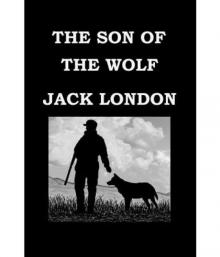 The Son of the Wolf
The Son of the Wolf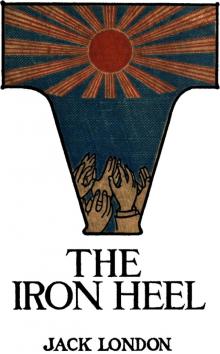 The Iron Heel
The Iron Heel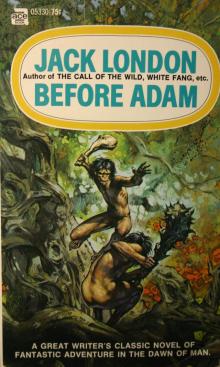 Before Adam
Before Adam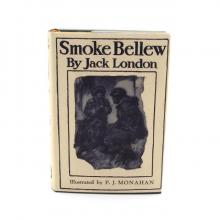 Smoke Bellew
Smoke Bellew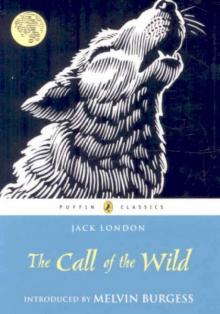 The Call of the Wild
The Call of the Wild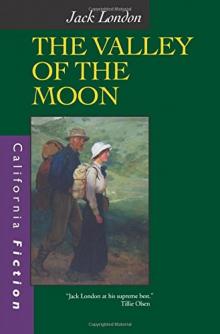 The Valley of the Moon Jack London
The Valley of the Moon Jack London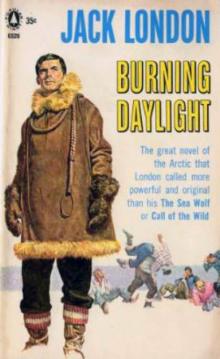 Burning Daylight
Burning Daylight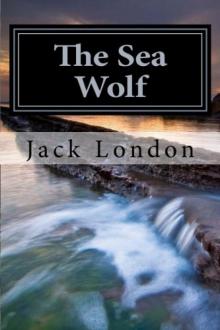 The Sea Wolf
The Sea Wolf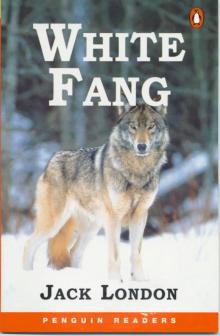 White Fang
White Fang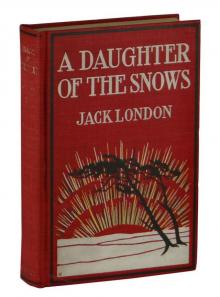 A Daughter of the Snows
A Daughter of the Snows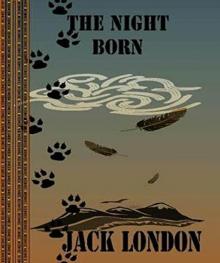 The Night-Born
The Night-Born A Son Of The Sun
A Son Of The Sun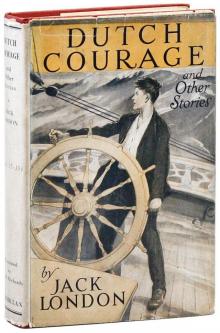 Dutch Courage and Other Stories
Dutch Courage and Other Stories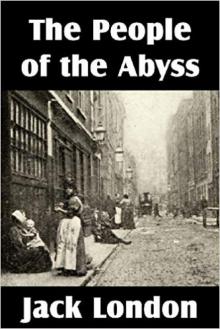 The People of the Abyss
The People of the Abyss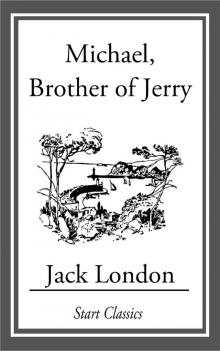 Michael, Brother of Jerry
Michael, Brother of Jerry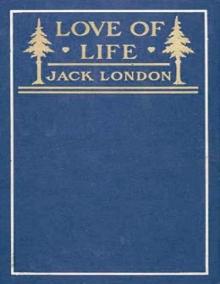 Love of Life, and Other Stories
Love of Life, and Other Stories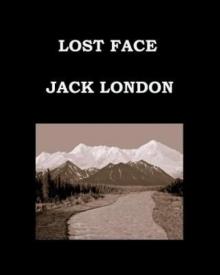 Lost Face
Lost Face The Road
The Road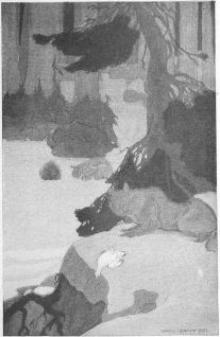 Love of Life
Love of Life The Turtles of Tasman
The Turtles of Tasman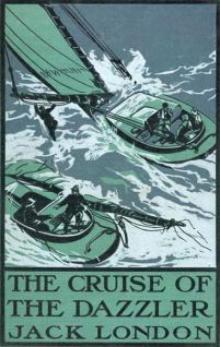 The Cruise of The Dazzler
The Cruise of The Dazzler The Heathen
The Heathen The Scab
The Scab The Faith of Men
The Faith of Men Adventure
Adventure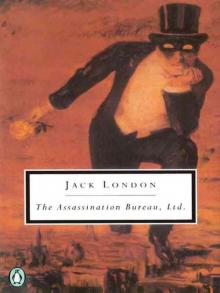 The Assassination Bureau, Ltd.
The Assassination Bureau, Ltd.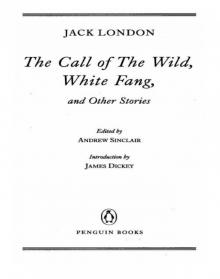 The Call of the Wild, White Fang, and Other Stories
The Call of the Wild, White Fang, and Other Stories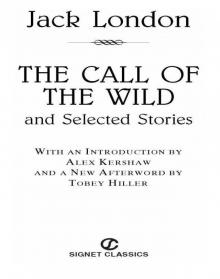 The Call of the Wild and Selected Stories
The Call of the Wild and Selected Stories Jerry of the Islands
Jerry of the Islands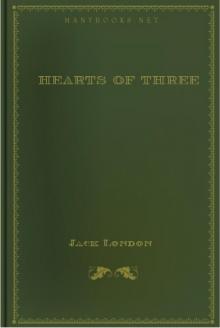 Hearts of Three
Hearts of Three The House of Pride
The House of Pride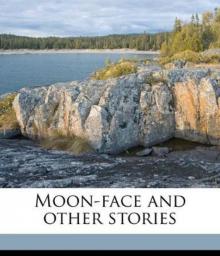 Moon-Face and Other Stories
Moon-Face and Other Stories Children of the Frost
Children of the Frost South Sea Tales
South Sea Tales The Strength of the Strong
The Strength of the Strong The Jacket (The Star-Rover)
The Jacket (The Star-Rover) The Little Lady of the Big House
The Little Lady of the Big House John Barleycorn
John Barleycorn ADaugter of Snows
ADaugter of Snows The Mutiny of the Elsinore
The Mutiny of the Elsinore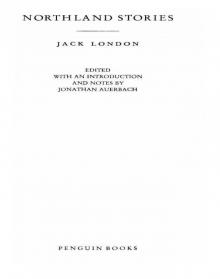 Northland Stories
Northland Stories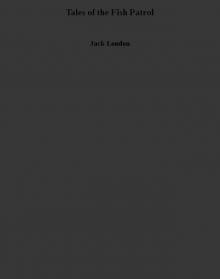 Tales of the Fish Patrol
Tales of the Fish Patrol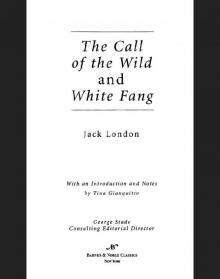 Call of the Wild and White Fang (Barnes & Noble Classics Series)
Call of the Wild and White Fang (Barnes & Noble Classics Series) The Valley of the Moon
The Valley of the Moon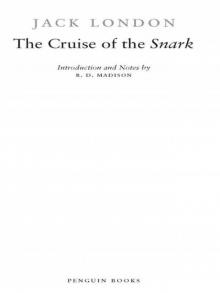 The Cruise of the Snark
The Cruise of the Snark The Game
The Game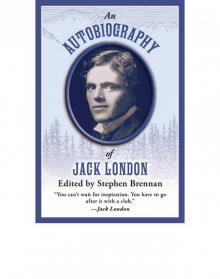 An Autobiography of Jack London
An Autobiography of Jack London